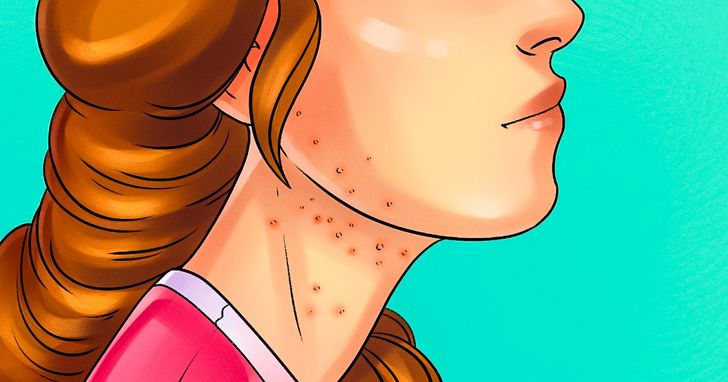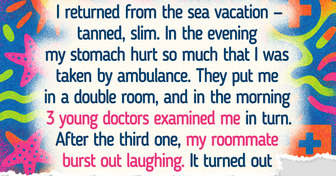10 Stories That Prove Blended Families Are Equal Parts Chaos and Love


Sugar tastes good, and everything that contains it tastes even better! The sweet crystalline carbohydrate seems to be everywhere. Most of us love to dwell on the unforgettable taste of our favorite desserts when we’re hungry. However, what might seem to be an innocent pleasure is actually the reason for many complicated health issues when we consume it in large amounts. Today, sugar is hard to avoid but many of us don’t even realize how addicted to it we actually are.
Bright Side has gathered several warning signs your body gives you that indicate it’s time to step away from the sweet stuff.
Do you feel like you’ve been skipping regular walks, gardening, or golfing because you’re in pain? It may be one of many signals that your body uses to warn you about the inflammatory processes going on inside. High amounts of sugar in your diet make immune cells secrete inflammatory messengers into your blood that try to break down advanced glycation end-products, or protein bound to a glucose molecule.
The more sugar you eat, the more advanced glycation end-products appear, resulting in more inflammatory messengers being sent to break the cycle. Such a cascade of biochemical reactions could eventually result in arthritis, cataracts, heart disease, poor memory or wrinkled skin.
Sugar gets processed really fast, leaving you feeling hungry despite the fact that you scarfed down a muffin just one hour ago. In fact, sugar is known for releasing dopamine, similar to what you would feel when using addictive drugs. The neurotransmitter dopamine is released by neurons in this system in response to a rewarding event. This particular chemical is most famous for keeping us in a good mood.
The brain sees sugar as a reward or a treat and the more sugar you eat, the more your body craves it. It’s a vicious and addictive cycle. Plus, food high in sugar won’t make you feel full because it doesn’t contain any useful nutrients.
Glucose is responsible for the energy supply in your body, which why it’s very important to keep the level of sugar in your blood at a proper level. Any deviation from this may lead to energy yo-yo-ing throughout the day. When you eat sweets, the pancreas releases insulin to help bring glucose to the cells leaving you with a rush of energy. Once the cycle ends, you feel the level of energy drop because your body wants more sugar.
To maintain your energy levels, avoid eating sweets and unhealthy snacks. Instead, opt for lean proteins and healthy fats. Get “real” energy for your body from healthy foods. This more even level of sugar in your blood won’t cause energy spikes and dips.

Foods that contain added sugar cause insulin levels to spike and begin the process of glycation, or bonding of sugar to protein molecules. As soon as glucose enters your blood it launches a series of complicated physiological processes that may ultimately cause inflammation and skin issues. This insulin boost can eventually increase the activity of oil glands in your skin and activate inflammatory processes.
It means that a high sugar diet is associated with a higher risk of acne flare-ups. If your unruly skin bothers you and none of the medical treatments seem to help, try changing your dieting habits. We don’t insist on cutting sugar from your life entirely, but you might want to consume fewer foods that contain added sugar.
It’s never a pleasant surprise to find that your jeans feel tighter around the waist. You never expected that a chocolate cake you ate a week ago could backfire in such nasty way! However, one of the most obvious signs of overdoing it with sugar is putting on some weight.
Snacks and sweets usually store pounds in your midsection. A high level of sugar increases the production of insulin that stores excess fat in your belly rather than some other place.
Sweet foods inarguably promote the formation of cavities and tooth decay. However, it’s not sugar that makes your teeth rot, but rather, the debris from foods left on the teeth after you eat. If not digested or brushed properly, food debris causes the appearance of plaque on your teeth. It erodes the hard surface of a tooth resulting in tiny holes.
Different sugary foods like candy, dry cereal, and breath mints can get stuck between your teeth where it’s hard to reach, speeding up the process of decay. Maintaining proper oral hygiene might save you from regular dentist appointments.
When you eat a lot of sweets every day your taste buds get used to the same level of sweetness and might not respond to it as they used to. Excess sugar dulls your palate and sweet fruits and berries don’t taste as sweet to you as they should. Believe us, there’s nothing better than eating a juicy apple and enjoying its taste. If nothing tastes sweet to you, cut down the consumption of extra sugary additives, like refined sugar and sweet syrups, and switch to a well-balanced diet.
Eating or drinking too much sugar blocks the immune system cells from attacking bacteria when you get sick. The vitamin C that your body needs to fight the flu is very similar in its chemical structure to glucose. Instead of looking for and working with vitamin C, your immune system takes the glucose which has zero power against flu bacteria. Therefore, instead of fighting a disease, your immune system suffers from it.
To prevent such a scenario, cut down on sweets when you’re at risk of getting a cold or the flu and eat more fruits and vegetables that are rich in nutrients and vitamins C and E, as well as beta-carotene and zinc.
Bloating and painful gas, as well as other digestive discomforts, can be caused by different foods. And eating too much sugar is one of them. Because bloating is directly connected to what you eat and try to digest, sugar plays a big role in it. If sugars are poorly absorbed in the small intestine, they’ll enter the large intestine where sugar usually acts like a gas-producing bacteria.
Too much sugar can wreak havoc in your belly, so try to avoid eating sweeteners, diet coke, and snack bars. It’s interesting to note that sugar-free foods are replete with sugar alcohols that contain sweet-tasting indigestible compounds.
According to the World Health Organization, the recommended dose of sugar should be less than 10% of your daily energy intake. This daily 10% equates to 6 tsp of added sugar for women and 9 tsp for men.
Sugar is inarguably tasty, and we all love it, but eating too much of it can have too many detrimental consequences. Watch out for the signs discussed above and try to cut down your daily intake of sugar. Find sugar in natural products like fruits, vegetables, nuts, or cereal.
Do you think having a sweet tooth is worth the price? Share your opinion with us in the comments!











